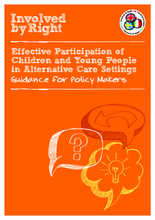Introduction
This guidance aims to raise awareness of the importance of children and young people in alternative care settings being able to make, influence and participate in decisions about their own lives, and other matters affecting them. It emanates from the Involved by Right European project 2011-13, funded by the European Commission’s Daphne III programme.
Involved by Right was a partnership between the Royal Borough of Kensington and Chelsea (RBKC) in England, Helsingborg local authority in Sweden and the local Social Health Unit in Bassano del Grappa, Italy, as well as Barnardo’s and the National Children’s Bureau. The intended audience is policy makers working in EU member states, though we hope the document will also be of value to those working in alternative care settings, and to children and young people.
The Involved by Right Youth Advisory Board (YAB) participated in a child protection workshop with the author of this guidance during a weekend residential meeting in September 2012. All YAB members, who were aged between 12 and 20 years, had experience of alternative care, either in England, Italy or Sweden. Four key messages came from the workshop which have informed, and underpin, the whole of this guidance:
- Children and young people are really good at judging whether adults respect them or not
- Children and young people have lots of ideas and views about how they are cared for, and what would make life better for them. They are willing to share these ideas and views but professionals have to be genuine about wanting to listen and learn
- Social services can make things much worse for children and young people when they do not support them to make and influence decisions about their own lives
- Many of the changes which children and young people want would not cost a lot of money: what’s extremely important is that social workers and others have a good attitude and show they care about children and young people.
Although the document makes reference to law, policy and practice in a variety of European countries, England features heavily because young people in alternative care in this country have been collectively pressing for change for 40 years and the legal and policy framework is generally sound.
Many of the practices common in English children’s homes in the 1970s, and before, would be unthinkable today – the purchase of children’s clothes using an order book; the routine recording of girls’ menstrual cycles; and Black children’s identity, culture and hair and skin needs being systematically denied for example. These stopped because young people – often with adult assistance – documented the harm they caused and persuaded policy makers to bring about change.
Painful lessons have been learned about the abuse of children living away from home, and we are now more aware of the needless suffering caused by running establishments as institutions, rather than homes.

